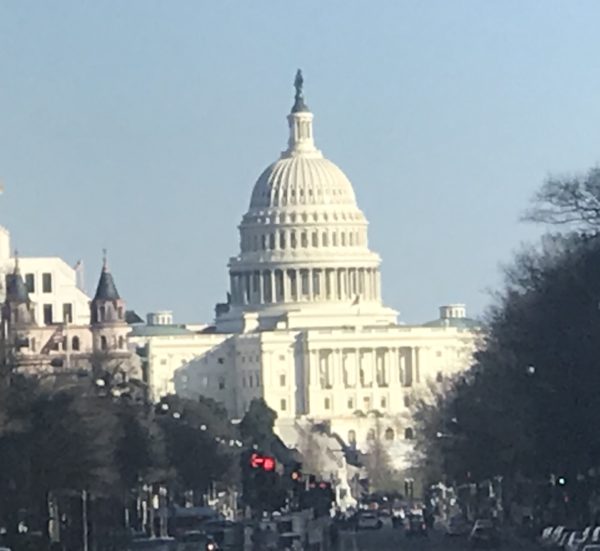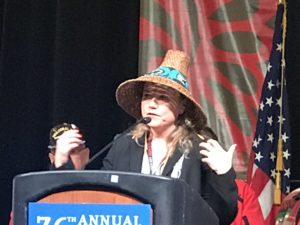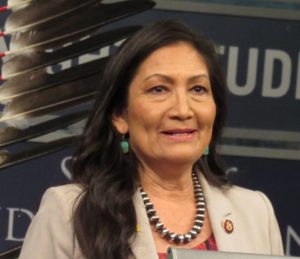
- Details
- By Levi Rickert
Rep. Deb Haaland (D-NM-01) to give congressional response
WASHINGTON, D.C. — Preceding the kickoff of the National Congress of American Indians Winter Session in the nation’s capital, the group’s president will present the State of Indian Nations address on Monday, Feb. 10 at the Jack Morton Auditorium at The George Washington University.
 NCAI President Fawn Sharp making acceptance
NCAI President Fawn Sharp making acceptance
speech last October in Albuquerque.
Elected last October to serve as president of the nation’s the oldest, largest and most representative American Indian and Alaska Native tribal government organization in the country, NCAI President Fawn R. Sharp will make her inaugural State of Indian Nations Address.
The annual State of Indian Nations address will be attended by tribal leaders and officials, members of Congress, government employees and the general public.The speech will outline the goals of tribal leaders, the opportunities for success and advancement of Native peoples, and priorities to advance nation-to-nation relationship with the United States.
President Sharp is the 23rd president of the NCAI and the third woman to hold the position of NCAI president. She currently serves as president of the Quinault Indian Nation in Taholah, Wash. Known as an effective national speaker, Sharp is a strong advocate of the environmental rights for tribal nations throughout Indian Country.
 Rep. Deb Haaland giving last year's Congressional
Rep. Deb Haaland giving last year's Congressional
Response at the State of Indian Nations address.
Representative Deb Haaland (D-NM-01) will give the Congressional response address to the State of Indian Nations address. Rep. Haaland is one of the first American Indian women elected to Congress. She is a tribal citizen of the Pueblo of Laguna.
President Sharp's address, and Congressional Response will be broadcast live from the Jack Morton Auditorium.
Schedule of Events
10:30 am: State of Indian Nations address
11:00 am: Congressional Response
11:15 am: Question & Answer Session
11:30 am: Closing Remarks
CLICK to watch the State of Indian Nations address on Monday morning.
More Stories Like This
Native News Weekly (August 25, 2024): D.C. BriefsUS Presidents in Their Own Words Concerning American Indians
Native News Weekly (December 14, 2025): D.C. Briefs
Wounded Knee Massacre Site Protection Bill Passes Congress
Two Murdered on Colville Indian Reservation
Help us defend tribal sovereignty.
At Native News Online, our mission is rooted in telling the stories that strengthen sovereignty and uplift Indigenous voices — not just at year’s end, but every single day.
Because of your generosity last year, we were able to keep our reporters on the ground in tribal communities, at national gatherings and in the halls of Congress — covering the issues that matter most to Indian Country: sovereignty, culture, education, health and economic opportunity.
That support sustained us through a tough year in 2025. Now, as we look to the year ahead, we need your help right now to ensure warrior journalism remains strong — reporting that defends tribal sovereignty, amplifies Native truth, and holds power accountable.
 The stakes couldn't be higher. Your support keeps Native voices heard, Native stories told and Native sovereignty defended.
The stakes couldn't be higher. Your support keeps Native voices heard, Native stories told and Native sovereignty defended.
Stand with Warrior Journalism today.
Levi Rickert (Potawatomi), Editor & Publisher

